Informal Islamic Places of Worship, not supervised by Kosovo’s Islamic Community, have been opened in some neighbourhoods of Pristina, Gjilan, and Fushë Kosovë, BIRN found ten years after the Kosovo police had closed one such place in the capital, suspected of recruiting terrorists.
Several informal Islamic places of worship have been established across Kosovo without authorization from Kosovo Islamic Community, BIK , ignoring its internal regulation that requires a licence to open locations for persons to practise religious rituals and/or teach.
Fitim Flugaj, a Kosovo based theologian and member of the leadership of BIK, told Kallxo Përnime TV Programme, on June 7, that “one primary reason for their (informal places of worship) lack of licensing is that, according to BIK, there are already sufficient locations for conducting religious rites. Additionally, they do not align with the Hanafi school (traditionally practised in Kosovo), exhibiting differences in ritual practices”.
“Such preaching activities have the potential to sow discord among the population,” he added.
BIRN found that in the Kosovo cities, Prishtina, Gjilan, and Fushe Kosove, practitioners of Islam have opened informal places of worship, which are not supervised by BIK.
In 2014, BIK had decided to standardise the religious teachings in Kosovo mosques and increase the supervision of Islamic preachings.
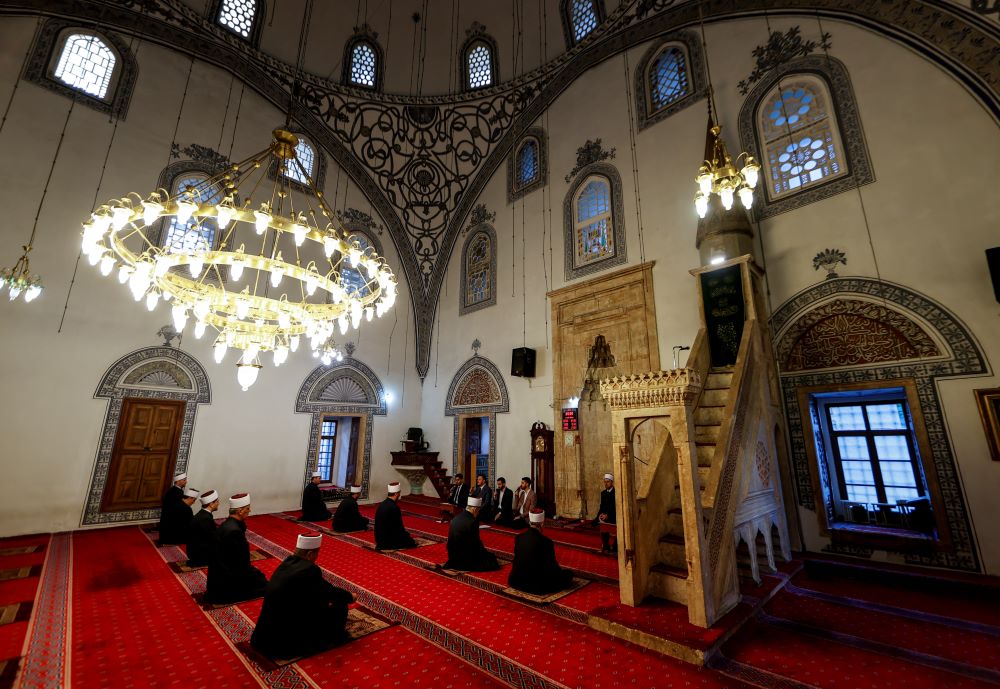
Imams attend Eid al-Fitr prayers that mark the end of the fasting holy month of Ramadan, while sitting at a minimum distance at the Grand Mosque in Pristina, Kosovo 24 May 2020. EPA-EFE/VALDRIN XHEMAJ
For several years, the sermons under the control of BIK continued without any major problems, but recently BIRN discovered three locations where Islam is preached without any supervision or licence by BIK.
Flugaj explained that these places of worship, also known as masjids, are small and do not have the status of a mosque and can be opened without any licence from authorities.
Experts warn that the informal places of worship in Kosovo pose a danger to young people, who could be indoctrinated. Indeed, ten years ago, Kosovo Police had closed down an informal place of worship in the Dardania neighbourhood, in Prishtina, suspected of recruiting terrorists.
Skënder Perteshi, from the Kosovo based think tank Institute for Security and Resilience in Prevention, told Kallxo Përnime that the purpose and funding source of these buildings should be examined.
“Most of the people who attend are young and can be radicalised. People usually perform their rituals at the nearest centre, but a debate should be opened about whether to either integrate them or close them down,” he said.
“They also belong to a legal school not practised in Kosovo, which conflicts with the Hanafi school that has been established for 600 years in these regions, a school that fights extremist thought and has differences in rituals,” Perteshi added.
Flugaj said that BIK is not able to close them, and that measures should instead be taken by the state.
Lack of legal framework adds to rising tensions within religious communities
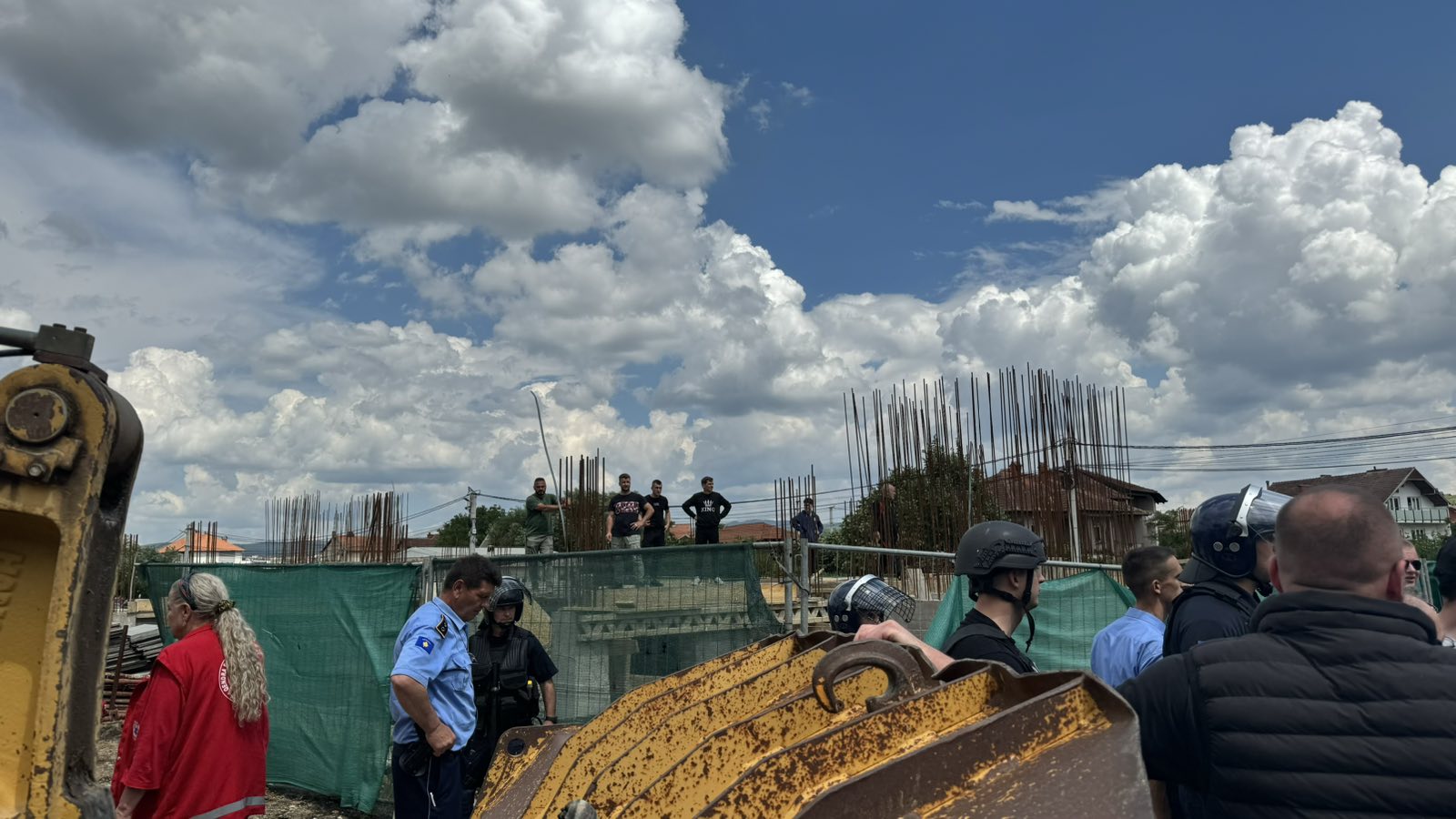
Police Special Unit Intervention in Illegal Construction of a Mosque in Shkabaj Village, Photo: BIRN
On May 30, residents of Shkabaj, a village on the outskirts of Prishtina, opposed the demolition of a mosque that had been constructed without municipal permission. The situation escalated to the point that the Special Police Unit went to the scene to create conditions for deconstruction.
In recent weeks, Kosovo has experienced several similar incidents rooted in religious disagreement. The lack of a legal framework for religious communities and the insufficient control over informal religious groups and activities are considered key obstacles to effectively addressing this issue, according to experts.
Nonetheless, the main religious communities in the country have their own internal regulatory bodies through which they issue licences to groups seeking to build new worship places.
According to the 2023-2028 Kosovo national strategy on prevention and fight against terrorism, radicalization is a phased and complex process in which an individual or a group embraces a radical ideology or belief that accepts, uses, or condones violence, including acts of terrorism, to achieve a specific political or ideological goal.
[embedded content]
The strategy explains that while the defining characteristic of extremism is the rejection of one or more fundamental principles of its main ideology. A nationalist who considers members of all other nations as inferior, or who rejects the possibility of coexistence, or believes that others should be denied rights, is an extreme nationalist. A religious believer who condemns leaders or the majority of members of his faith is an extremist. Extremists are not necessarily violent. One day after the incident in Shkabaj, another erupted in a village of Podujeva, where local residents rejected the appointment of a new imam for their mosque.
In addition to problems within the Islamic community, an indictment was issued on May 28 against two Orthodox priests from Albania on charges of inciting national, religious and ethnic hatred stemming from a break-in at a unused Serbian Orthodox church in November 2023.
“Legal vacuum without adequate oversight”
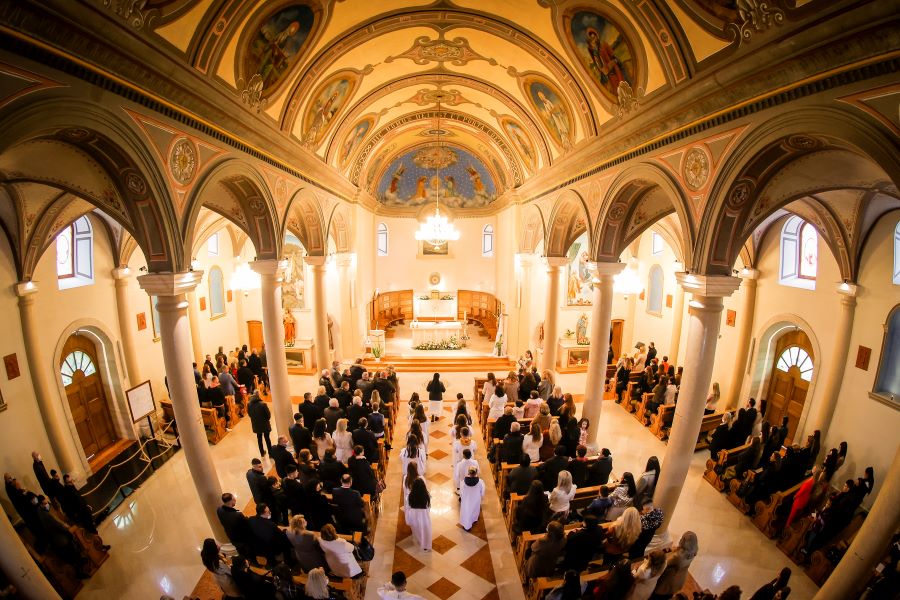
Faithful attend an Easter Mass on Easter Sunday at the Roman Catholic Cathedral of the Lady Helper in the southern town of Prizren, Kosovo, 04 April 2021. EPA-EFE/VALDRIN
Experts told BIRN that there is a need for state support and a clear legal framework to empower religious groups in Kosovo to manage their communities effectively.
Flugaj, contends that the recent incidents are less about religious extremism and more about personal grievances and the lack of effective action by BIK.
“A significant part of the problem involves different groups and families fighting for dominance within a mosque or community,” he explained.
“BIK is not an executive institution and it needs state backing to assert its authority. We still lack a law on religion, and religious communities are not officially recognized by the state”, he further stated.
For more than a decade, the Kosovo Assembly has failed to pass a draft law that provides a legal framework for the registration of religious communities. Such laws require a two-thirds majority of both Albanian members of parliament and MPs representing ethnic minorities. If the draft law submitted to parliament is approved, it would provide for the automatic registration and legal status of the six largest religious communities in Kosovo – the Islamic Community of Kosovo, the Serbian Orthodox Church, the Catholic Church, the Jewish Community, the Evangelical Protestant Church, and the Sufi Dervish order.
Ethnic Serb Kosovo MPs have consistently boycotted the assembly’s attempts to pass such a law because the Serbian Orthodox Church insists it does not need “approval” from a state that Serbia does not recognize.
According to an opinion of the Venice Commission published in 2013, some provisions of the draft law violate Articles 9 and 11 of the European Convention on Human Rights. This is because religious communities without legal personhood could encounter “discriminatory legal obstacles” regarding property acquisition or rental, financial activities, and protection of their rights.
The commission also stated that “the registration of religious organisations should not be mandatory,” while also writing that it is appropriate to require registration for the purposes of obtaining legal personhood and similar benefits.
To ensure legal security, the Venice Commission also advised the authorities of Kosovo to ensure the inclusion of provisions requiring financial transparency for religious communities.
Lulzim Fushtica, a security expert and former National Coordinator for Prevention of Extremism and Terrorism from 2017-2019, points out that religious communities in Kosovo currently operate as NGOs, functioning in a legal vacuum without adequate oversight.
“The legal aspect needs to be regulated. Religious communities should be registered, given statutes, memberships, and clearly defined obligations and responsibilities”, Fushtica explained.
According to him, the key challenge in how to register religious communities is determining the number of preachers.
Fushtica, who is currently the director of emergencies for the Municipality of Prishtina, explained that “when I was in the (central) government , we submitted the first draft of the regulation and the main question was the number of members. We received responses from the Venice Commission, and the question was whether it should be 500, 5,000, or 50,000”.
Role of Extremism
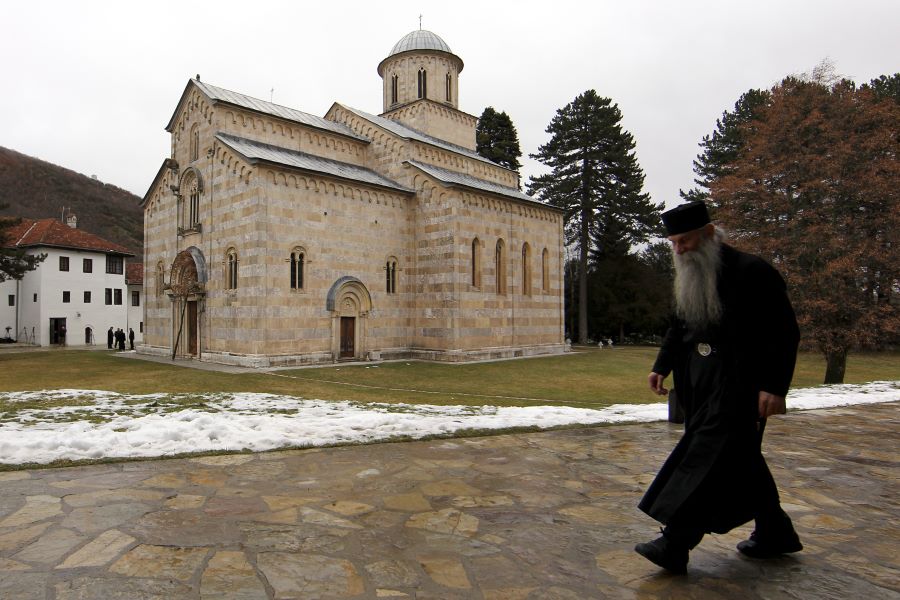
An Orthodox monk walks at Orthodox Visoki Decani Monastery, in Decani, Kosovo, 06 January 2012. EPA/VALDRIN XHEMAJ
Unauthorised constructions of places of worship, funding discrepancies and the lack of control from higher bodies are considered key factors contributing to the unrest between Islamic communities.
Perteshi, stressed that it should never have come to physical clashes between citizens and the police. According to him, such situations only serve to heighten dissatisfaction with BIK and can fuel extremism.
“We should have addressed these issues long before they escalated. Building half of a structure and then sending the police to intervene is an unnecessary problem. These actions increase discontent with BIK and feed extremism,” he stated.
Perteshi’s comments highlight how unauthorised mosque construction, funded by various sources, often leads to disputes that are misinterpreted as terrorism. He emphasised the need for accurate information to prevent society from being misled.
Post-War NGOs and Radicalization
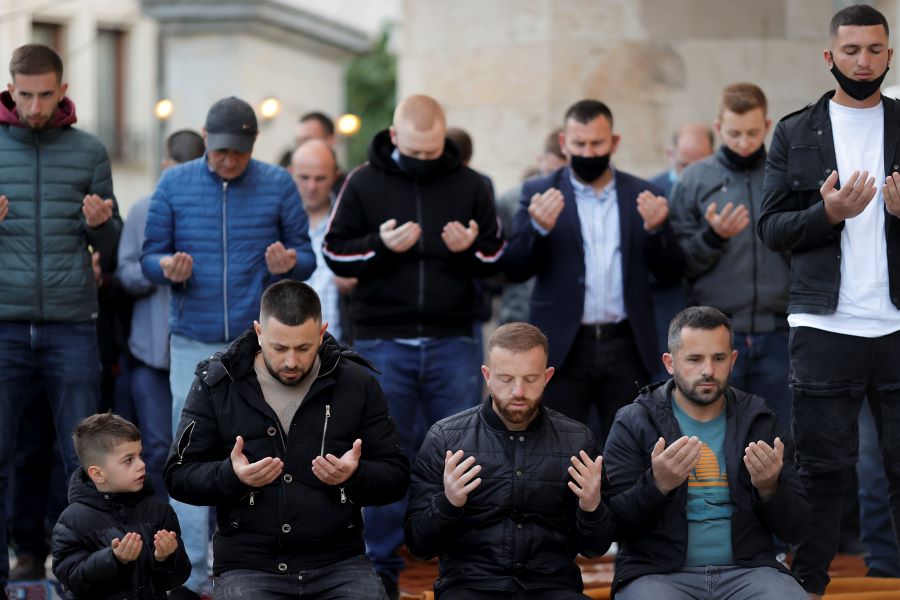
Muslims attend a morning prayer session to celebrate Eid al-Fitr, which marks the end of Ramadan, at the Grand Mosque in Pristina, Kosovo, 13 May 2021. EPA-EFE/VALDRIN XHEMAJ
One of the reasons for the increase in disputes and noticeable polarisation of society is the lack of control over NGOs that entered Kosovo after the war, experts believe. Some organisations claimed to be for charity but spread doctrines and interpretations that do not align with the traditional form of religious teachings.
Rrahman Sylejmani, a former investigator for the Kosovo Police, stated that this legal vacuum allowed these groups to strengthen and radicalise.
“The lack of Kosovo institutions at that time, until 2008 (when Kosovo declared its independence from Serbia), greatly influenced the situation,” Sylejmani emphasised, adding that ”the absence of a law regulating the relationship between the state and religious organisations allowed these groups to strengthen and radicalise. Additionally, events in the Middle East directly influenced the emergence of various phenomena in Kosovo.”
According to him, BIK was not interested in addressing these issues because they do not control all of their imams.
He even emphasised that some imams, instead of working against the growth of extremism, have further encouraged it.
“I provided data to BIK with names before it reached the point of state intervention. The chief imam did not express readiness to deal with them and did not offer any help,” Sylejmani elaborated.
Flugaj agreed that the root cause was a legal vacuum.
“About 3,000 associations were registered after the war here, and other ideologies were imported because there was no control,” he said.
Sylejmani explained that ”those people, depending on where they were educated in Arab countries, brought practices that were not compatible with traditional Islam, which then led to the rise of extremism and an increase in radicalization.”
However, “the conflict within the Orthodox community is a new phenomenon,” Fushtica claimed.
“In the last two years, we have noticed an increase in far-right extremism based on nationalism, which is tied to the rise of similar beliefs in Western Europe. This phenomenon should be monitored to see what the goal is and who is behind it,” he added, explaining that it should be evaluated whether such extremism ”has the potential to create an artificial conflict within the community or cause harm to overall security”.
Flugaj stated that the number of Albanian Orthodox believers in Kosovo is minimal and that internal “conflict is more present within the Albanian community”.
Meanwhile, Fetah Zejnullahu, a former Kosovo Security Force colonel, stated that instances of extremism should be addressed according to their motivation, be it religious, political, or financial.
“There must be proper control by security institutions,” he said, listing some of the factors that have contributed to an increase in extremism, including “the transition after 1999 (war), the non-existence of Kosovo institutions until 2008, non-membership in international institutions, and influences from the East and the West”.
“When there is space, individuals use it,”” he explained.
On the subject of extremism, Sylejmani said that, due to different types of preaching, BIK’s authority had been damaged, and that the state should not be lenient, as in the past.
“There have been organisations with dubious financing and extremist elements. Kosovo is a secular country; a strict and clear line of separation between the state and religion must be drawn. Not all imams deliver proper sermons, which has directly influenced radicalization,” he added.
Please enable JavaScript to view the comments powered by Disqus.